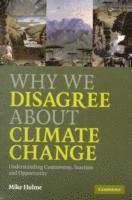
- Format
- Häftad (Paperback)
- Språk
- Engelska
- Antal sidor
- 428
- Utgivningsdatum
- 2009-04-30
- Förlag
- Cambridge University Press
- Illustratör/Fotograf
- 2 halftones 1 table
- Illustrationer
- 2 halftones 1 table
- Dimensioner
- 230 x 154 x 20 mm
- Vikt
- Antal komponenter
- 1
- Komponenter
- 23:B&W 6 x 9 in or 229 x 152 mm Perfect Bound on White w/Gloss Lam
- ISBN
- 9780521727327
- 670 g
Why We Disagree about Climate Change
Understanding Controversy, Inaction and Opportunity
- Skickas från oss inom 7-10 vardagar.
- Fri frakt över 249 kr för privatkunder i Sverige.
Passar bra ihop
De som köpt den här boken har ofta också köpt The SWOT Analysis: Using your Strength to overc... av Lawrence G Fine (häftad).
Köp båda 2 för 588 krKundrecensioner
Fler böcker av Mike Hulme
-
Weathered
Mike Hulme
-
Companion to Environmental Studies
Noel Castree, Mike Hulme, James D Proctor
-
Climate Change
Mike Hulme
-
Can Science Fix Climate Change?
Mike Hulme
Recensioner i media
'This is a very rare book. A scientific book about climate change, that deals both with the science, and our own personal response to this science. It does all this supremely well, and should be compulsory reading for both sceptics and advocates. However, it does so much more, it is a book of great modesty and humanity. It uses climate change to ask questions more broadly about our own beliefs, assumptions and prejudices, and how we make individual and collective decisions.' Chris Mottershead, Distinguished Advisor, BP p.l.c.
'In this personal and deeply reflective book, a distinguished climate researcher shows why it may be both wrong and frustrating to keep asking what we can do for climate change. Tracing the many meanings of climate in culture, Hulme asks instead what climate change can do for us. Uncertainty and ambiguity emerge here as resources, because they force us to confront those things we really want - not safety in some distant, contested future but justice and self-understanding now. Without downplaying its seriousness, Hulme demotes climate change from ultimate threat to constant companion, whose murmurs unlock in us the instinct for justice and equality.' Sheila Jasanoff, Harvard University
'This book is a 'must read' for anyone interested in the relationship between science and society. As we know from other controversies over GM Crops and MMR, by the time science hits the headlines, and therefore the public consciousness, it's always about much more than the science. This book shines a fascinating light on this process by revealing how climate change has been transformed from a physical phenomenon, measurable and observable by scientists, into a social, cultural and political one ... This book is so important because Mike Hulme cannot be dismissed as a skeptic yet he is calling for a radical change in the way we discuss climate change. Whether or not people agree with his conclusions - this book is a challenging, thought-provoking and radical way to kick start that discussion.' Fiona Fox, Director, Science Media Centre, London
'With empirical experience that includes seven years' leading the influential Tyndall Centre, Professor Hulme here argues that science alone is insufficient to face climate change. We also 'need to reveal the creative psychological, spiritual and ethical work that climate change can do and is doing for us'. It is the very 'intractability of climate change', its sociological status as a 'wicked' problematique, that requires us to reappraise the 'myths' or foundational belief systems in which the science unfolds. That returns Hulme to the bottom line question: 'What is the human project ultimately about?' and herein resides this book's distinctive importance.' Alastair McIntosh, University of Strathclyde and author of Hell and High Water: Climate Change, Hope and the Human Condition
'A much needed re-examination of the idea of climate change from a vantage point that takes its c...
Övrig information
Mike Hulme is Professor of Climate Change in the School of Environmental Sciences at the University of East Anglia (UEA), and Founding Director of the Tyndall Centre for Climate Change Research. He has published over 100 peer-reviewed journal papers and over 30 books or book chapters on climate change topics. He has prepared climate scenarios and reports for the UK Government, the European Commission, UNEP, UNDP, WWF-International and the IPCC. He is leading the EU Integrated Project ADAM (Adaptation and Mitigation Strategies) during the period 2006-2009, which comprises a 26-member European research consortium contributing research to the development of EU climate policy. He co-edits the journal Global Environmental Change and is Editor-in-Chief of the Interdisciplinary Review on Climate Change.
Innehållsförteckning
List of figures; List of tables; List of boxes; Acknowledgements; Preface; Foreword Steve Rayner; 1. The social meanings of climate; 2. The discovery of climate change; 3. The performance of science; 4. The endowment of value; 5. The things we believe; 6. The things we fear; 7. The communication of risk; 8. The challenges of development; 9. The way we govern; 10. Beyond climate change; Bibliography; Index.
Du kanske gillar
-
What's Your Dream?
Simon Squibb
Inbunden -
Language Of Dragons
S F Williamson
Inbunden


